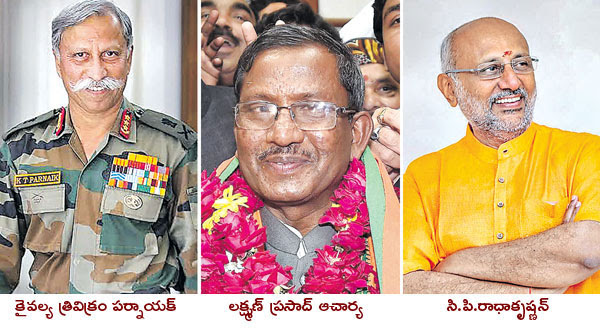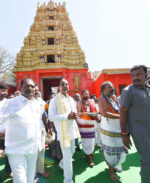-Galla S Kiran Kumar,Bureau Chief Telagana (Andhra Pradesh)
Biswabhushan Harichandan transferred to Chhattisgarh
New governors for 13 states
including six first-time appointments
Seven moved
today – Delhi
The central government has appointed Justice S. Abdulnazeer, a former judge of the Supreme Court, as the new governor of Andhra Pradesh. Biswabhushan Harichandan, who was working here till now, has been transferred to Chhattisgarh. New governors have been appointed for all 13 states. Six of them are new. Seven were transferred from one state to another state. Justice Abdul Nazeer was born on 5th January 1958 in Beluwai, Moodabidari Taluk, Karnataka. All childhood passed in three and two. He graduated from Mahaveera College there and completed his law degree from Kodiyalbail SDM Law College, Mangalore. Enrolled as an advocate on 18th February 1983 and started practicing law in Karnataka High Court. Appointed as Additional Judge of Karnataka High Court on 12 May 2003. Promoted as Permanent Judge on 24 September 2004.

As a member of key tribunals..
As a judge of the Supreme Court, Justice Abdulnazeer was a member of the tribunals that heard the priority cases like triple talaq, Ram Janmabhoomi, demonetisation. On August 22, 2017, three of the five-member bench that heard the triple talaq case ruled that the practice was unconstitutional, while the then Chief Justice Justice Khehar and Justice Abdulnazeer, who headed the bench, ruled in favor of the triple talaq practice. It is said that it is allowed in Muslim Sharia law. Justice Nazir, who was a member of the five-member bench that heard the Ram Janmabhoomi case in 2019, agreed with the bench’s unanimous verdict in favor of the Ram temple, upholding the report of the Archaeological Survey of India that the disputed site had a structure following Hindu religious tradition. With that, the Supreme Court opened the dispute which has been going on for a long time with the support of 5-0 judges. Justice Abdul Nazeer headed the Constitution Bench which on January 2 this year ruled by a ratio of 4:1 that the decision taken by the Prime Minister Narendra Modi-led government on demonetisation was wrong. Justice Abdul Nazeer, Justice BR Gavai, Justice AS Bopanna and Justice Ramasubramanian who were the members of the bench said that the central government has the power to cancel the currency notes, but Justice BV Nagaratna gave a different verdict. The current CJI Justice DY Chandrachud commented that Justice Abdul Nazir is a nickname for simplicity. Till 2019 he did not even have a passport. It was recalled that he went to Moscow as part of his first foreign visit as a judge of the Supreme Court for an official program. It was reminded that he is very simple in all matters and until recently his identity cards were only driving license and judge ID. He delivered 93 judgments during his six years as a Supreme Court judge. Justice Nazir was also a member of the nine-judge Constitution Bench unanimous verdict in the case of Justice KS Puttuswamy v. Union of India in 2017 that personal privacy is a fundamental right conferred by the Constitution. He also participated in the five-judge bench which struck down the review petition seeking a review of the Supreme Court judgment upholding the Aadhaar Act by a ratio of 4:1. The social, social and Justice Nazir was also a member of the bench that ruled that the Economic Backward Classes Act-2018 was inconsistent with the 50% reservation limit set by the Supreme Court. He also participated in the bench which ruled with a 4:1 majority in the Birsingh v. Delhi Jalbord case that those recognized as SC and ST in one state cannot get reservation under those categories in another state. A Constitution Bench headed by Justice Abdulnazeer ruled in Kaushal Kishore v. State of UP case by a 4:1 majority on January 3, a day before his resignation, that the freedom of expression of government officials cannot be controlled by other fundamental rights. He also participated in the Bench which ruled with a 4:1 majority in the Birsingh v. Delhi Jalbord case that persons recognized as STs cannot get reservation under that category in another state. A Constitution Bench headed by Justice Abdulnazeer ruled in Kaushal Kishore v. State of UP case by a 4:1 majority on January 3, a day before his resignation, that the freedom of expression of government officials cannot be controlled by other fundamental rights. He also participated in the Bench which ruled with a 4:1 majority in the Birsingh v. Delhi Jalbord case that persons recognized as STs cannot get reservation under that category in another state. A Constitution Bench headed by Justice Abdulnazeer ruled in Kaushal Kishore v. State of UP case by a 4:1 majority on January 3, a day before his resignation, that the freedom of expression of government officials cannot be controlled by other fundamental rights.

Second Judge to be appointed by the Governor
After serving as a judge of the Supreme Court, Justice Abdul Nazir will be the second person to take charge as the governor. This first record belongs to the former Chief Justice of the Supreme Court, Justice P. Sadashivam from Tamil Nadu. He retired on 26 April 2014 and was appointed as the Governor of Kerala on 5 September 2014. It is the first time that a former Supreme Court judge has been appointed as the Governor. This is also the first appointment of the Governor by the Narendra Modi government. Justice Abdul Nazir got that chance again. At present, Maharashtra Governor Bhagatsingh Kosyari and Ladakh Lieutenant Governor RK Mathur have resigned from their posts and the central government has accepted it.



